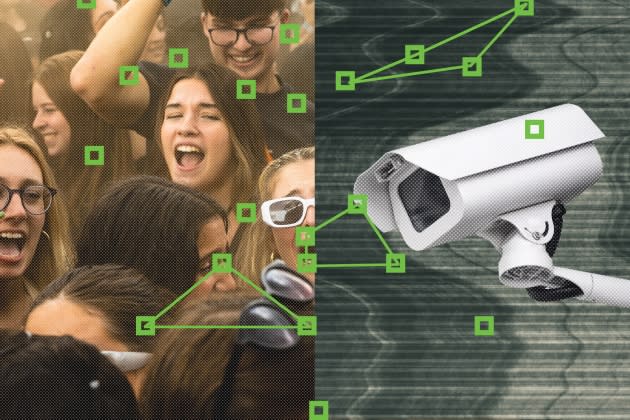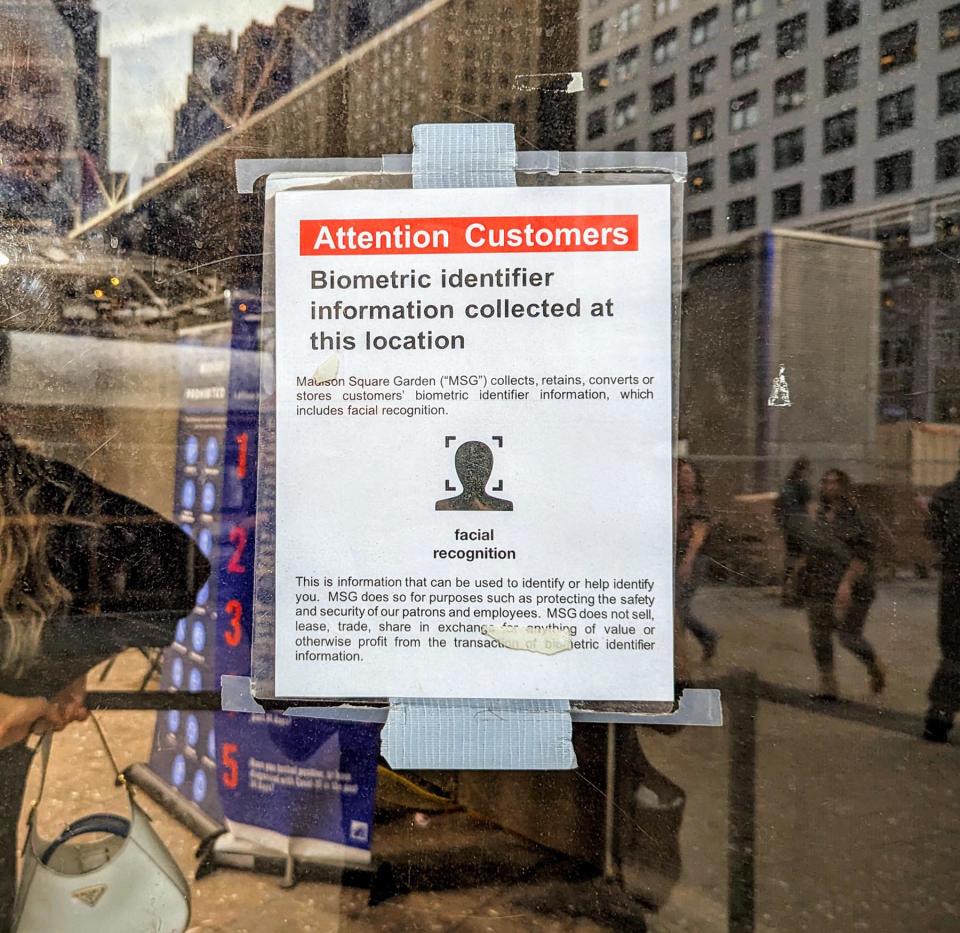Going to a Show? Prepare to Surrender Your Data
- Oops!Something went wrong.Please try again later.

Customer data is a goldmine in the live music industry as promoters, venue operators, ticket marketplaces, and the artists themselves seek to learn more about their audiences and their habits to better serve them — and get them to spend more.
From the moment fans check out online all the way to when they walk through security and buy a beer, data collection is everywhere. Some venues use giveaway prompts at concerts to get concertgoers to provide their phone number, while something as simple as an admission bracelet can track which parts of a festival get the most foot traffic.
More from Rolling Stone
While that may sound scary to an uninformed concertgoer on the surface — and, yes, in some cases that data may be improperly used — proponents say the live music business’s data drive is usually more focused on refining how their business works rather than being intrusive. Data has long been a black box, and especially in a thin margins business like concerts, companies are searching for more ways to ensure they can run efficiently.
Still, as transactions become less private and more sophisticated, customers should be educated on what they’re giving up — and what they’re comfortable with. Evan Greer, the director of digital-rights advocacy group Fight for the Future, has repeatedly echoed the importance of legislation that ensures data collection cannot be exploited.
“Our consumer power here is pretty limited,” Greer says, “and so it’s really time to exercise our grassroots power and our ostensible democratic power to hold our elected officials accountable to putting some basic protections in place that crack down on abuse of data collection.”
Here are some of the key areas where you’re most likely giving up your data, both inside and outside the concert gates.
At Ticket Checkout
Companies get a bulk of personal data before a concertgoer even steps through the doors. Whether buying tickets directly on an artist’s or venue’s website, or through ticket marketplaces like Ticketmaster, AXS, or StubHub, customers are usually giving their IP addresses when they enter the site. By the time a user is online to get their tickets (unless they’ve taken extra measures to hide their data), they’ve already provided the website owner with their approximate location via their IP address. According to Greer, some services might also be able to learn how a user found their way to the website, whether that was from a search on, say, Google or by clicking through an advertisement.
Of course, to actually purchase a ticket, customers freely give their credit card information, email address, and phone number, among other data. Overall, the ticketers often have a full name, email address, physical address, postal code, and cell phone number. One promoter, who prefers to remain anonymous, tells Rolling Stone that when looking through Ticketmaster’s dashboard for a show, they can also mine percentages of gender breakdown, marital status, and income groups.
At the Door
Data collection doesn’t stop at the ticket purchase. For years, traditional CCTVs (closed-circuit television cameras) have been a core security measure at large-scale events, and they remain a common way that your image is captured at shows. But compared to the biometric technology that’s starting to be implemented at venues, old-school cameras seem downright archaic.
Biometric tech is perhaps the most controversial new development reaching live music, and it’s primed to become one of the biggest issues as more venues adopt it. Facial recognition technology, which scans the faces of fans as they enter a concert, has garnered significant attention in recent months. Among the chief reasons an artist may employ the tech is safety: During her Reputation Tour, Taylor Swift used face-scanning to keep her safe from known stalkers.
But face-scanning can also be used more controversially. James Dolan and Madison Square Garden harnessed the power of facial recognition to have lawyers whose firms are involved in lawsuits against the company identified and tossed from the building. Last year an attorney named Barbara Hart told Rolling Stone that she was removed from Brandi Carlile’s Madison Square Garden concert in October after facial recognition technology tracked her.
Hart, whose firm was litigating against MSG in a class action suit but who isn’t involved in the litigation herself, called the tactic “retaliatory behavior of powerful people against others, and that should be concerning to us,” she said. “It was a very eerie experience to be on the receiving end of.”
Madison Square Garden has faced significant scrutiny over the practice from local lawmakers and the affected firms themselves. Dozens of lawyers sued over the policy, while some lawmakers have threatened to revoke tax benefits for the venue. The State Liquor Authority had been probing whether the policy abided its laws and if it could revoke MSG’s liquor license, as the New York Post reported in March, and MSG sued the Authority over the probe (that suit was dismissed). While MSG faced a preliminary injunction over the policy last year, an appeals court ruled that the lawyer ban could stand, though MSG could be subject to pay fines when removing the lawyers from non-sporting events.
“MSG instituted a straightforward policy that precludes attorneys from firms pursuing active litigation against the Company from attending events at our venues until that litigation has been resolved,” the company has said. “While we understand this policy is disappointing to some, we cannot ignore the fact that litigation creates an inherently adversarial environment.”

Madison Square Garden uses facial recognition at all its venues including the Beacon Theatre and Radio City Music Hall. But MSG is far from the only venue that’s equipped with the tech. FirstEnergy Stadium, home of the Cleveland Browns, offers facial recognition technology for express entry into the venue. Hard Rock Stadium in Miami, New York’s Citi Field, and Mercedes-Benz Stadium in Atlanta also all use the tech.
As RS reported recently, several high-profile artists including Rage Against the Machine’s Tom Morello and Zach de la Rocha alongside Boots Riley and Speedy Ortiz all vowed to boycott any venue utilizing face-scanning technology. But biometrics doesn’t stop with face-scanning. Last year, Red Rocks Amphitheater in Morrison, Colorado, abandoned the use of Amazon’s palm-scanning technology at the venue.
Outside of security, a venue may use data plays to get the information of concertgoers who didn’t pay for the ticket themselves — for example, if one person bought multiple tickets for friends. While such customers are inside the venue as patrons, the operators have less of their data since they didn’t buy tickets themselves. To secure at least some information, venues can stage contests or giveaways, the promoter says, from VIP experiences to tickets to another show, which could require entering your phone number for SMS messages, encouraging fans to participate while also collecting that data.
At the Concession Stand
According to the promoter we spoke to, during the pandemic their company had developed a mobile application that facilitated cashless payments for food, beverages, and merchandise. The app was born out of safety necessity, but it also turned out to be an effective way to collect clearer data on what people were buying. The promoter says that data could be useful in corporate sponsorships, a huge part of the live music machine.
“If you’ve got Corona and Budweiser in the house and everyone’s buying Budweiser, that tells you something,” the promoter says. “You could talk to Budweiser and see if they’re interested in being a building sponsor.”
There’s also that valuable data of what fans of specific types of music may want to buy at the shows.
“You could learn trends about genre,” the promoter says, “if certain audiences like ‘X’ whereas others might like ‘Y.’”
In the Festival Footprint
While you often have to give up your physical home address when buying a ticket, some live events can follow your whereabouts at the actual show. Prominent music festivals often require attendees wear RFID bracelets throughout their events. On its face, RFID offers a quicker way into a venue, but the real value for show promoters actually comes from the data contained therein.
Coachella, for instance, can track attendees’ location on the festival grounds through the bracelets or through its mobile app on a user’s phone. Attendees can be tracked when they’re near “proximity beacons” on site, or when their bracelets are scanned entering and exiting certain areas. Such data can help break down foot traffic across the venue, which then helps Coachella promoters plan for the future by gauging who drew the largest crowds or what acts might pair well with each other when scheduling stages and set times.
Best of Rolling Stone

